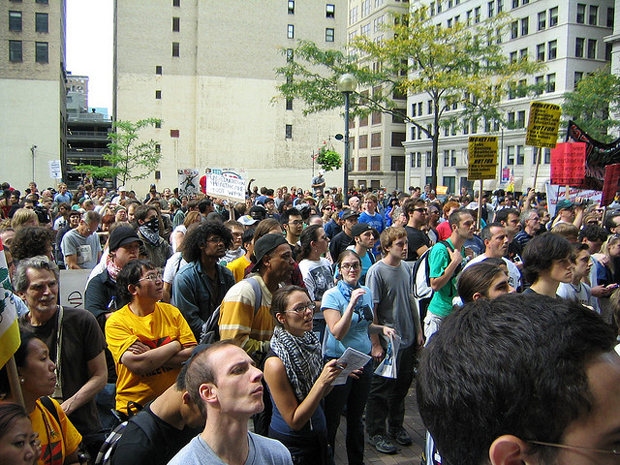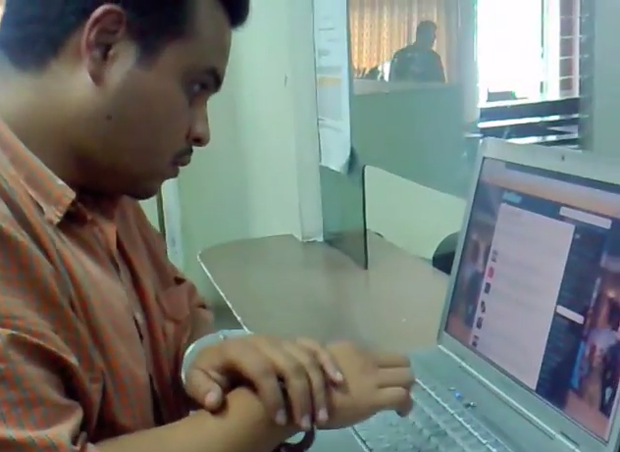14 May 2015 | Awards, Bahrain, Bahrain Statements, Campaigns, mobile

Bahraini human rights defender Nabeel Rajab (Photo: The Bahrain Institute for Rights and Democracy)
The decision by a Bahraini appeals court to uphold a six-month sentence against Nabeel Rajab is a sad example of how the country treats freedom of expression. Index strongly protests the court’s verdict and demands the country halt its judicial harassment of human rights defenders.
“Index reiterates its call on Bahrain to end its harassment of activists like Rajab, who are being punished for exercising their democratic right to free speech. We ask Britain, as a close ally of Bahrain, to insist that the kingdom upholds its human rights commitments”, Index on Censorship CEO Jodie Ginsberg said.
Rajab was handed down a six-month suspended sentence pending payment of a fine in January for a tweet that both the ministry of interior and the ministry of defence claimed “denigrated government institutions”.
The tweet in question stated:
Since then, Rajab’s appeal against the verdict has been postponed repeatedly and he was arrested on 2 April over subsequent tweets and an opinion piece published on the Huffington Post. If he is convicted on all current charges, Rajab could face more than 10 years in prison.
Rajab is a former winner of a Index on Censorship freedom of expression award, president of the Bahrain Center for Human Rights and a member of Human Rights Watch’s Middle East Advisory Board. He has continuously been targeted by Bahraini authorities over his human rights campaigning work. He was released in May 2014 after spending two years in prison on spurious charges including writing offensive tweets and taking part in illegal protests.
Last month, Rajab’s civil society colleagues human rights defender Abdulhadi Al-Khawaja and political activist Salah Al-Khawaja were prevented from attending the funeral of their eldest brother Abdulaziz, who passed away in Bahrain. Abdulhadi is serving a life sentence due to his human rights work and Salah is serving five years for his political activism; both are prisoners of conscience and torture survivors.
This statement was posted on 14 May 2015 at indexoncensorship.org
27 Apr 2015 | Bahrain, mobile, News and features

Nabeel Rajab during a protest in London in September (Photo: Milana Knezevic)
Index on Censorship condemns the extended detention of Bahraini human rights activist Nabeel Rajab, who was arrested in early April for detailing abuses at the country’s Jaw prison. On 26 April, Bahraini authorities prolonged Rajab’s detention for a further 15 days.
Rajab tweeted on April 2 that his house had been surrounded by special forces and that over 20 police cars were sent to his house for the arrest.
Rajab was handed down a six month suspended sentence pending payment of a fine in January for a tweet that both the ministry of interior and the ministry of defence said “denigrated government institutions”.
The tweet in question stated:
Since then, Rajab’s appeal against the verdict has been postponed repeatedly.
Rajab, president of the Bahrain Center for Human Rights and a member of Human Rights Watch’s Middle East Advisory Board, has continuously been targeted by Bahraini authorities over his human rights campaigning work. He reported on 26 February he had again been summoned by the police.
Rajab, a 2012 Index on Censorship Freedom of Expression award winner, was released in May 2014 after spending two years in prison on spurious charges including writing offensive tweets and taking part in illegal protests.
“Bahrain must stop the harrassment of Nabeel Rajab,” Index on Censorship CEO Jodie Ginsberg said. “The country has committed publicly to respecting human rights, but continues to flout its international commitments by denying its citizens the right to peaceful protest, peaceful assembly, and to free expression.”
Last week, Rajab’s civil society colleagues human rights defender Abdulhadi and political activist Salah Al-Khawaja were prevented from attending the funeral of their eldest brother Abdulaziz, who passed away in Bahrain on April 22. Abdulhadi is serving a life sentence due to his human rights work and Salah is serving five years for his political activism; both are prisoners of conscience and torture survivors.
Earlier this year, Bahrain revoked the citizenship of 72 individuals, including journalists, bloggers, and political and human rights activists, rendering many of them stateless – its latest attempt to crack down on those critical of the government.
15 Mar 2015 | Bahrain, Campaigns, Middle East and North Africa, mobile
Index on Censorship award winner Nabeel Rajab had the final hearing on his appeal delayed for a third time, until April 15. Rajab, who is appealing his sentence over a tweet, remains under a travel ban.
“It is clear that Bahrain government can’t simply send Bahrain’s leading human rights defenders to jail while the United Nation’s human rights council in Geneva is still in session. Intimidation against him will not stop, they don’t want to end up his case as it will lead to lifting the travel ban, which is something Bahraini government very afraid of”, Sayed Alwadaei, director of advocacy for Bahrain Institute for Rights and Democracy, told Index in an email.
Index’s CEO Jodie Ginsberg said that “the continual postponements of Nabeel’s court dates is another example of how justice is not being served in Bahrain. While his case is still pending, Nabeel is not free to travel, and kept in perpetual uncertainty about his future. And all because Nabeel expressed an opinion. We call on the Bahraini authorities to drop all charges against him and for the international community to ensure that Bahrain meets its international commitments on human rights.”
In January, Rajab, the president of the Bahrain Center for Human Rights, was handed down a six-month suspended sentence pending a fine over the following tweet:
Bahrain’s ministry of interior and ministry of defence both alleged the tweet “denigrated government institutions”. Rajab was released on bail while appealing the verdict, the outcome of which was expected on March 15 before being delayed a month.
Rajab, one of Bahrain’s most prominent human rights activist, has been continuously targeted by authorities in relation to his human rights campaigning work. He was released from prison last May, where he spent two years on charges which included writing offensive tweets and participating in illegal protests.
On 12 March, Rajab wrote to Federica Mogherini, the European Union’s foreign policy chief. Calling for further international support for himself and his fellow human rights activists, he said he was “deeply disappointed by the EU’s lack of strong action to back up its human rights commitments in its foreign policy”.
He also wrote of his latest questioning by police, in early March. He says he was accused of inciting hatred towards the regime, for, among other things “accusing the police and ministry of interior with torturing detainees” and “calling the events happening in Bahrain a revolution”.
“These accusations cannot more obviously target my freedoms of expression and association,” Rajab stated. “Moreover, they are directly related to my work as a human rights activist.”
Echoing Rajab, Alwadaei believes the response from the international community could have significant impact on Rajab’s case: “I strongly believe the moment they [Bahraini authorities] feel they have less international pressure on his case he will be sent directly to prison.”
This article was posted on 13 March 2015 at indexoncensorship.org
23 Jan 2015 | News and features
Bahrain
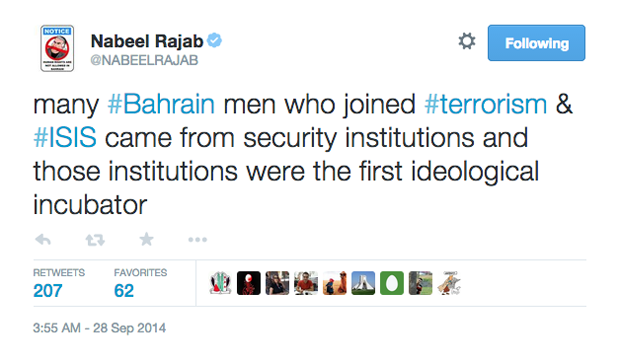
This week, prominent Bahraini human rights activist Nabeel Rajab was handed down a six month suspended sentence over a tweet in which both the country’s ministry of interior and ministry of defence allege that he “denigrated government institutions”. Rajab was only released last May after two years in prison, over charges that included sending offensive tweets. His experience is not unique in Bahrain. In May 2013, five men were arrested for “insulting the king” via Twitter.
Turkey
A former Miss Turkey was recently arrested for sharing a satirical poem criticising the country’s President Recep Tayyip Erdogan on her Instagram account. She is set to go on trial later this year. Turkey has a chequered relationship with social media, temporarily banning both Twitter and YouTube in the wake of the Gezi Park protests, in large part organised and reported through social media. In 2013, authorities arrested 25 individuals for spreading “untrue information” on social media.
Saudi Arabia
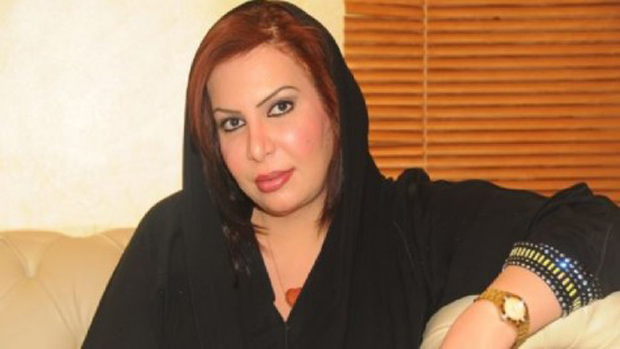
(Photo: Gulf Centre for Human Rights)
In late 2014, women’s rights activist Souad Al-Shammari was arrested during an interrogation over some of her tweets. The charges against her include “calling upon society to disobey by describing society as masculine” and “using sarcasm while mentioning religious texts and religious scholars”, according to the Gulf Centre for Human Rights.
France
![(Photo: « Source : Réseau Voltaire » [CC BY-SA 3.0 (http://creativecommons.org/licenses/by-sa/3.0)], via Wikimedia Commons](https://www.indexoncensorship.org/wp-content/uploads/2015/01/Dieudonné_Axis_for_Peace_2005-11-18.jpg)
(Photo: Réseau Voltaire [CC BY-SA 3.0], via Wikimedia Commons)
Following the series of terrorist attacks in Paris in early January, at least 54 people have been detained by police for “defending or glorifying terrorism”. A number of the cases, including against comedian Dieudonne M’bala M’bala, are believe to be connected to social media comments.
Britain

A 22 year old man was arrested in for “malicious communication” following Facebook messages made in response to the murder of soldier Lee Rigby, and another user was arrested after taunting Olympic diver Tom Daly about his dead father. More recently, police arrested a 19-year-old man over an “offensive” tweet about a bin lorry crash in Glasgow that killed six people. TV personality Katie Hopkins, known for her controversial tweets, was also reported to Scottish police following some tasteless tweets about about Scots. The incident prompted Scottish police the to post their now infamous tweet declaring they would continue to “monitor comments on social media“.
China
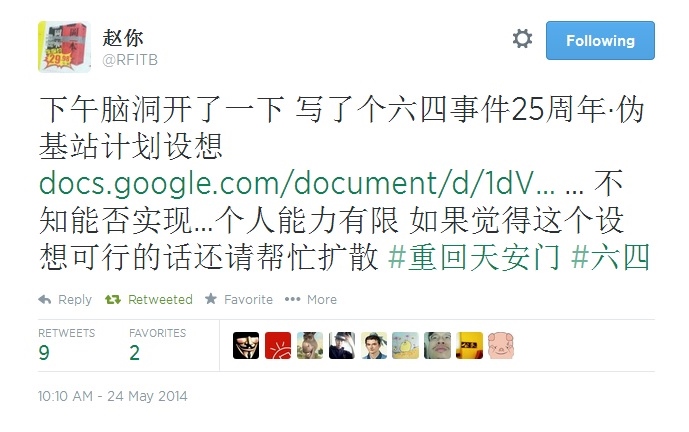
Online activist Cheng Jianping was arrested on her wedding day in 2010 for “disturbing social order” by retweeting a joke by her fiance. She was sentenced to one year of “re-education through labour”. Twitter is officially banned in China, and microblogging site Weibo is a popular alternative. In 2013, four Weibo users were arrested for spreading rumours about a deceased soldier labelled a hero and used in propaganda posters. The four were said to have “incited dissatisfaction with the government”, according to the BBC.
Australia

A teen was arrested prior to attending a Pink concert in Melbourne for tweeting: “I’m ready with my Bomb. Time to blow up #RodLaverArena. Bitch.” The tweet referenced lyrics from the American popstar’s song Timebomb.
India
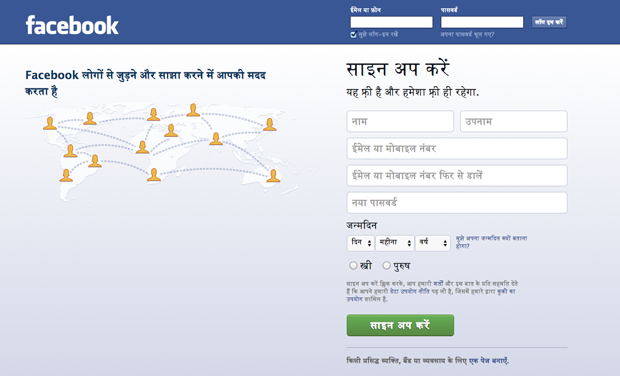
An Indian medical student was arrested in 2012 over a Facebook post questioning why her city of Mumbai should come to a standstill to mark the death of a prominent politician. Her friend was arrested for liking the post. Both were charged with engaging in speech that was offensive and hateful.
United States
Back in 2009, a New York man was arrested, had his home searched and was placed under £19,000 bail for tweeting police movements to help G20 protesters in Pittsburgh avoid the officers. According to Global Voices, it is unclear whether his actions were actually illegal at the time.
Guatemala
A man was arrested in 2009 for causing “financial panic” by tweeting that Guatemalans should fight corruption by withdrawing all their money from banks.
This article was posted on 23 January, 2015 at indexoncensorship.org




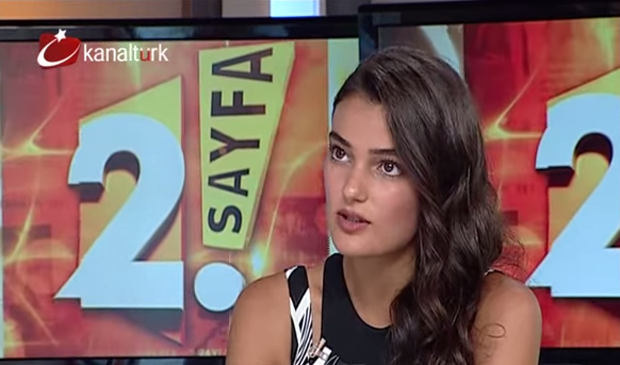

![(Photo: « Source : Réseau Voltaire » [CC BY-SA 3.0 (http://creativecommons.org/licenses/by-sa/3.0)], via Wikimedia Commons](https://www.indexoncensorship.org/wp-content/uploads/2015/01/Dieudonné_Axis_for_Peace_2005-11-18.jpg)




